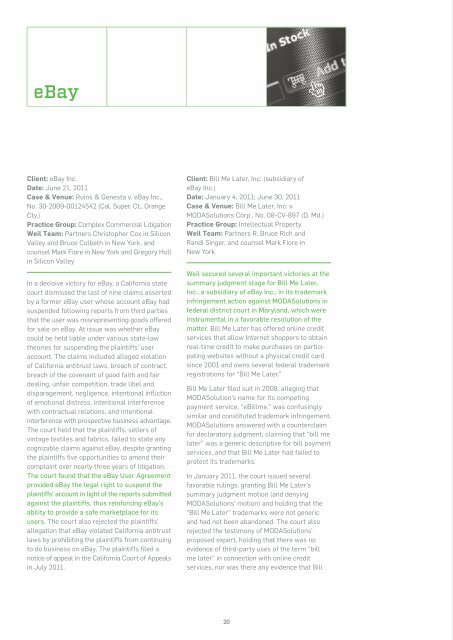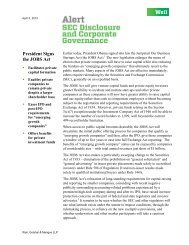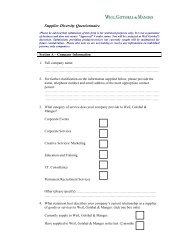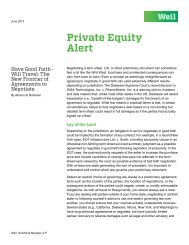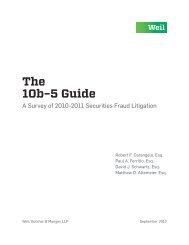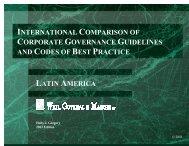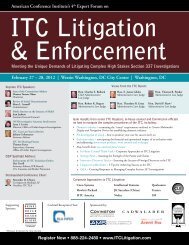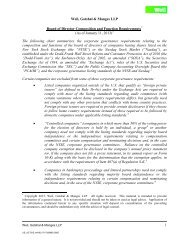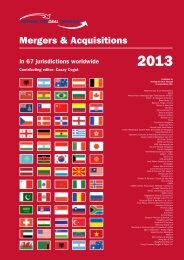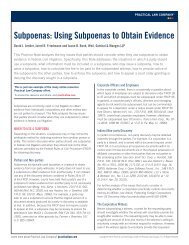Download PDF - Weil, Gotshal & Manges
Download PDF - Weil, Gotshal & Manges
Download PDF - Weil, Gotshal & Manges
Create successful ePaper yourself
Turn your PDF publications into a flip-book with our unique Google optimized e-Paper software.
Leading firm for Intellectual<br />
Property – Nationwide<br />
Chambers USA 2011<br />
eBay<br />
Named “Leading” firm for<br />
Intellec tual Property Litigation<br />
in the US<br />
Benchmark Litigation 2012<br />
Client: eBay Inc.<br />
Date: June 21, 2011<br />
Case & Venue: Ruins & Genesta v. eBay Inc.,<br />
No. 30-2009-00124542 (Cal. Super. Ct., Orange<br />
Cty.)<br />
Practice Group: Complex Commercial Litigation<br />
<strong>Weil</strong> Team: Partners Christopher Cox in Silicon<br />
Valley and Bruce Colbath in New York, and<br />
counsel Mark Fiore in New York and Gregory Hull<br />
in Silicon Valley<br />
In a decisive victory for eBay, a California state<br />
court dismissed the last of nine claims asserted<br />
by a former eBay user whose account eBay had<br />
suspended following reports from third parties<br />
that the user was misrepresenting goods offered<br />
for sale on eBay. At issue was whether eBay<br />
could be held liable under various state-law<br />
theories for suspending the plaintiffs’ user<br />
account. The claims included alleged violation<br />
of California antitrust laws, breach of contract,<br />
breach of the covenant of good faith and fair<br />
dealing, unfair competition, trade libel and<br />
disparagement, negligence, intentional infliction<br />
of emotional distress, intentional interference<br />
with contractual relations, and intentional<br />
interference with prospective business advantage.<br />
The court held that the plaintiffs, sellers of<br />
vintage textiles and fabrics, failed to state any<br />
cognizable claims against eBay, despite granting<br />
the plaintiffs five opportunities to amend their<br />
complaint over nearly three years of litigation.<br />
The court found that the eBay User Agreement<br />
provided eBay the legal right to suspend the<br />
plaintiffs’ account in light of the reports submitted<br />
against the plaintiffs, thus reinforcing eBay’s<br />
ability to provide a safe marketplace for its<br />
users. The court also rejected the plaintiffs’<br />
allegation that eBay violated California antitrust<br />
laws by prohibiting the plaintiffs from continuing<br />
to do business on eBay. The plaintiffs filed a<br />
notice of appeal in the California Court of Appeals<br />
in July 2011.<br />
Client: Bill Me Later, Inc. (subsidiary of<br />
eBay Inc.)<br />
Date: January 4, 2011; June 30, 2011<br />
Case & Venue: Bill Me Later, Inc. v.<br />
MODASolutions Corp., No. 08-CV-897 (D. Md.)<br />
Practice Group: Intellectual Property<br />
<strong>Weil</strong> Team: Partners R. Bruce Rich and<br />
Randi Singer, and counsel Mark Fiore in<br />
New York<br />
<strong>Weil</strong> secured several important victories at the<br />
summary judgment stage for Bill Me Later,<br />
Inc., a subsidiary of eBay Inc., in its trademark<br />
infringement action against MODASolutions in<br />
federal district court in Maryland, which were<br />
instrumental in a favorable resolution of the<br />
matter. Bill Me Later has offered online credit<br />
services that allow Internet shoppers to obtain<br />
real-time credit to make purchases on participating<br />
websites without a physical credit card<br />
since 2001 and owns several federal trademark<br />
registrations for “Bill Me Later.”<br />
Bill Me Later filed suit in 2008, alleging that<br />
MODASolution’s name for its competing<br />
payment service, “eBillme,” was confusingly<br />
similar and constituted trademark infringement.<br />
MODASolutions answered with a counterclaim<br />
for declaratory judgment, claiming that “bill me<br />
later” was a generic descriptive for bill payment<br />
services, and that Bill Me Later had failed to<br />
protect its trademarks.<br />
In January 2011, the court issued several<br />
favorable rulings, granting Bill Me Later’s<br />
summary judgment motion (and denying<br />
MODASolutions’ motion) and holding that the<br />
“Bill Me Later” trademarks were not generic<br />
and had not been abandoned. The court also<br />
rejected the testimony of MODASolutions’<br />
proposed expert, holding that there was no<br />
evidence of third-party uses of the term “bill<br />
me later” in connection with online credit<br />
services, nor was there any evidence that Bill<br />
Me Later had failed to police its trademarks.<br />
The court also held that Bill Me Later could<br />
seek an accounting of MODASolutions’ profits<br />
should the evidence establish a likelihood of<br />
confusion. Following the court’s rulings, the<br />
parties settled the action, and on June 30, 2011,<br />
the parties’ respective claims were dismissed.<br />
Client: StubHub/eBay Inc.<br />
Date: June 27, 2011<br />
Client & Venue: Weinstein v. eBay Inc., et al.,<br />
No. 10-cv-8310 (S.D.N.Y.)<br />
Practice Group: Complex Commercial Litigation<br />
<strong>Weil</strong> Team: Partner David Lender, counsel<br />
Mark Fiore, and associates Eric Hochstadt and<br />
Kristen Echemendia in New York<br />
In another important win for eBay, <strong>Weil</strong> scored<br />
a complete dismissal, with prejudice, of a<br />
proposed class action alleging that StubHub,<br />
eBay (StubHub’s parent), and the New York<br />
Yankees, deceived consumers into paying<br />
higher prices for tickets purchased on StubHub’s<br />
website. In its June 2011 order dismissing the<br />
plaintiff’s amended complaint, the court<br />
concluded that the “[p]laintiff has struck out”<br />
and there was “no need to embark on costly<br />
and time intensive briefing of a motion to<br />
amend” because the plaintiff’s proposed<br />
amendments would not overcome the<br />
complaint’s “legal defects.”<br />
The plaintiff filed suit in late 2010, claiming<br />
that StubHub’s practice of not disclosing the<br />
identity of the seller and the face value of the<br />
resold ticket violated New York’s Arts and<br />
Cultural Affairs Law (ACAL), which regulates<br />
the resale of tickets, and General Business<br />
Law, which prohibits unfair or deceptive trade<br />
practices. The court dismissed eBay because<br />
the plaintiff alleged nothing more than a mere<br />
parent-subsidiary relationship between eBay<br />
and StubHub. As for StubHub, the court held<br />
that the plaintiff could not circumvent the<br />
exemption in the ACAL for websites that merely<br />
facilitate ticket sales, like StubHub; that the<br />
plaintiff’s ACAL claims otherwise failed because<br />
StubHub is not an “operator” of a place of<br />
entertainment according to the language of<br />
the statute; and that the statute contains no<br />
requirement that ticket resale or auction websites,<br />
again, like StubHub, print face value information<br />
on such tickets. Because the court found no<br />
ACAL violations, and because the StubHub<br />
website included disclaimers that it was not<br />
the ticket seller and that ticket prices may<br />
differ from face value, the plaintiff’s unfair and<br />
deceptive trade practices claim failed as well.<br />
20<br />
21


